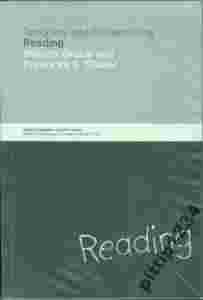Editorial Reviews
Review
"this is a very worthwhile book in a strong series and will truly engage a wide readership of those who wish to think about second language reading issues and make an impact on the reading activity amongst learners across the globe"
Reading in a Foreign Language
Volume 14, Number 2, October 2002
From the Back Cover
Applied Linguistics in Action Series
Series Editors: Christopher N. Candlin, Chair Professor of Applied Linguistics, Centre for English Language Education and Communication Research, City University of Hong Kong
David R. Hall, Head of Linguistics Department, Macquarie University, Sydney
Teaching and Researching: Reading
is designed to help language professionals understand the complex nature of reading. This volume builds connections from research on reading, to sound instructional practices and action research possibilities. Offering an overview of reading theory, it summarises the main ideas and issues in first and second language contexts and covers key research studies. Grabe and Stoller then explicitly link this research to teaching practice.
In addition to providing erudite research analysis, this is a practical volume and the authors offer advice for practitioners and researchers including a 12-step procedure for conducting meaningful action research projects on reading-related topics, with 27 outlined models for teacher adaptation and use, and numerous figures which can used for both action research and classroom instruction.
Learning aids are also featured in the text, including:
- key concept boxes and glossary of key terms
- quote boxes highlighting critical issues in the field
- index of studies summarised by theme
- index of model action research projects organised by theme
- resource list of relevant journals, books and websites.
Written in an accessible style, Teaching and Researching: Reading is a valuable resource for teacher trainers, practicing teachers, materials writers and researchers.
William Grabe is Professor of English and Chair of the English Department at Northern Arizona University. He is currently President of the American Association for Applied Linguistics.
Fredricka L. Stoller is Associate Professor of English at Northern Arizona University. She has coauthored two reading textbooks, developed reading curricula, and written teacher-training articles on reading instruction.
Poniższy spis treści pochodzi z drugiego wydania książki. Więcej szczegółów nt. spisu treści oraz wstępu znajdziecie Państwo w zamieszczonych skanach.
Contents
General Editors’ Preface
Authors’ Acknowledgements and Dedication
Publisher’s Acknowledgements
Introduction
Section I: Understanding L2 reading
1 The nature of reading abilities
1.1 Purposes for reading
1.2 Defining fluent reading comprehension
1.3 Describing how reading works: Components of reading abilities
1.4 Synthesising research perspectives: Models of reading
1.5 Conclusion
2 Comparing L1 and L2 reading
2.1 Linguistic and processing differences between L1 and L2 readers
2.2 Individual and experiential differences between L1 and L2 readers
2.3 Socio-cultural and institutional differences influencing L1 and L2 reading development
2.4 Conclusion
Section II: Exploring research in reading
3 Key studies in L1 reading
3.1 Research studies as stories: An extended example
3.2 Ten more key research studies
3.3 Seeing the story structure of research studies
3.4 Conclusion
4 Key studies in L2 reading
4.1 Topics to explore in L2 reading research
4.2 Ten good stories from L2 reading research
4.3 Conclusion
Section III: Teaching reading using evidence-based practices
5 Teaching reading: Sound foundations and effective practices
5.1 Implications from reading research
5.2 Curricular principles for reading instruction
5.3 Moving from curricular principles to instructional applications
5.4 Conclusion
Section IV: Investigating reading through action research
6 The reading teacher as action researcher
6.1 Teachers investigating their own classrooms: ‘How to’ guidelines
6.2 Conclusion
7 Vocabulary, fluency and motivation: Action research projects
7.1 Vocabulary action research projects
7.2 Fluency action research projects
7.3 Motivation action research projects
7.4 Additional action research questions
7.5 Conclusion
8 Strategic reading, discourse organisation and main-idea comprehension: Action research projects
8.1 Strategic reading action research projects
8.2 Discourse organisation action research projects
8.3 Main-idea comprehension action research projects
8.4 Additional action research questions
8.5 Conclusion
9 Reading-lesson stages, reading materials and extensive reading: Action research projects
9.1 Reading-lesson stages action research projects
9.2 Reading materials action research projects
9.3 Extensive reading action research projects
9.4 Additional action research questions
9.5 Conclusion
Section V: Resources
10 Resources for action research
10.1 Journals dedicated to reading and related issues
10.2 Journals that report studies related to reading and reading-related topics
10.3 Journals that periodically have articles related to teaching (and researching) L2 reading
10.4 L2 teacher resource books on reading and related topics
10.5 L1 teacher resource books with good ideas for L2 reading teachers
10.6 Teacher resources on action research
10.7 Web sites on reading and vocabulary
10.8 Web sites on graphic organisers
10.9 Web sites on action research
10.10 Professional organisations of interest to reading teachers
Glossary
References
Subject Index
Author Index
|

